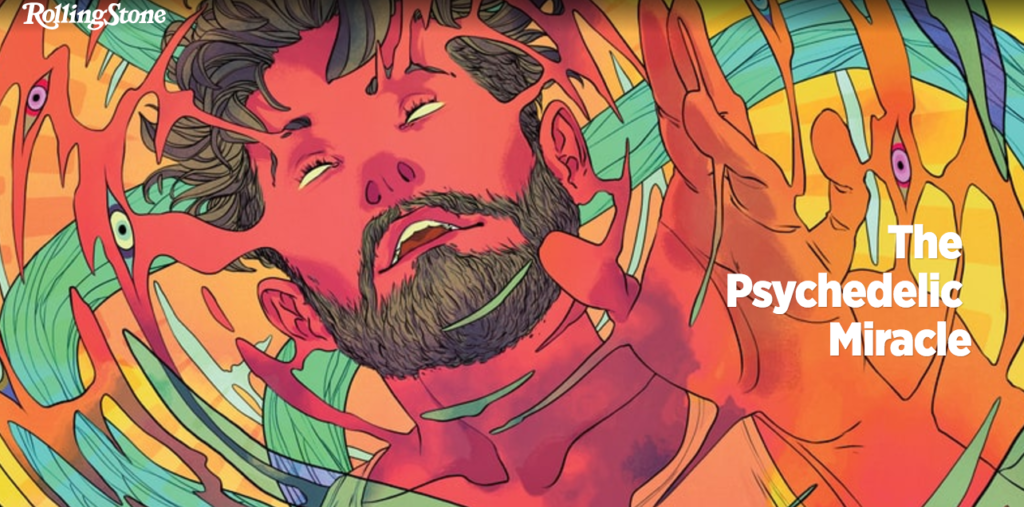
Apply now for this year’s Healing and Self-Expression Plant Medicine Retreat in The Sacred Valley and Machu Picchu, Peru.
“[Ayahuasca users] have become better partners to their spouses, better parents to their children, better children to their parents, better employees, better employers, just more responsible overall, bringing a higher level of ethical integrity to everything they do.” Dr. Charles Grob, Professor of Psychiatry and Biobehavioral Science, UCLA
Overview of Rolling Stone Magazine’s, “The Psychedelic Miracle”
In a world in need of healing, I find it deeply moving and inspiring that there are so many doctors, scientists, and therapist out there putting their own reputations at risk in the eyes of the establishment, to research and administer plant medicines for one profound reason alone:
They work.
This article covers the full spectrum of both the risks and challenges, as well as what’s possible through the educated use of psychedelics, including implications for deep healing for conditions such as childhood trauma and PTSD, as well as their uncanny ability to unlock creativity, innovation, and Self-expression.
Here’s an excerpt:
As an internal-medicine specialist, Dr. X doesn’t have any patients who come to him seeking psychotherapy. But the longer he does the work, the more “I’m seeing that consciousness correlates to disease,” he says. “Every disease.” Narcolepsy. Cataplexy. Crohn’s. Diabetes – one patient’s psychedelic therapy preceded a 30 percent reduction in fasting blood-sugar levels. Sufferers of food allergies discover in their journeys that they’ve been internally attacking themselves. “Consciousness is so vastly undervalued,” Dr. X says. “We use it in every other facet in our life and esteem the intellectual part of it, but deny the emotional or intuitive part of it.” Psychedelic therapy “reinvigorated my passion and belief in healing. I think it’s the best tool to achieving well-being, so I feel morally and ethically compelled to open up that space.“Currently – legally – we’re in the midst of a psychedelic renaissance. New York University, the University of New Mexico, the University of Zurich, Johns Hopkins University, the University of Alabama and the University of California-Los Angeles have all partnered with the psilocybin-focused Heffter Research Institute, studying the compound for smoking cessation, alcoholism, terminal-cancer anxiety and cocaine dependence; the biotech-CEO-founded Usona Institute funds research of “consciousness-expanding medicines” for depression and anxiety at the University of Wisconsin-Madison. Since 2000, the Multidisciplinary Association for Psychedelic Studies (MAPS), a nonprofit based in Santa Cruz, California, has been funding clinical trials of MDMA for subjects with PTSD, mostly veterans, but also police, firefighters and civilians. In November, the FDA approved large-scale Phase III clinical trials – the last phase before potential medicalization – of MDMA for PTSD treatment. MAPS, which has committed $25 million to achieving that medicalization by 2021, also supports or runs research with ayahuasca (a concoction of Amazonian plants), LSD, medical marijuana and ibogaine, the pharmaceutical extract of the psychoactive African shrub iboga. The organization is additionally funding a study of MDMA for treating social anxiety in autistic adults, currently underway at UCLA Medical Center. Another study, using MDMA to treat anxiety in patients with life-threatening illnesses, has concluded.“If we didn’t have some idea about the potential importance of these medicines, we wouldn’t be researching them,” says Dr. Jeffrey Guss, psychiatry professor at NYU Medical Center and co-investigator of the NYU Psilocybin Cancer Project. “Their value has been written about and is well known from thousands of years of recorded history, from their being used in religious and healing settings. Their potential and their being worthy of exploration and study speaks for itself.”